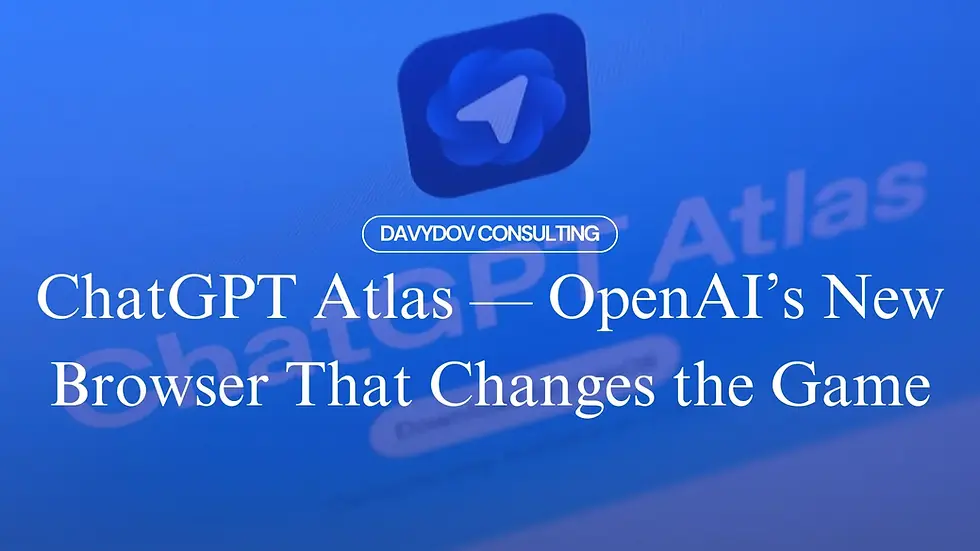ChatGPT Atlas - OpenAI’s New Browser That Changes the Game
- Davydov Consulting

- Oct 22, 2025
- 5 min read

On October 21, 2025, OpenAI officially introduced its first web browser, called ChatGPT Atlas. This launch became one of the most anticipated tech events of the year, marking OpenAI’s first step beyond chatbots into the core of internet access — the browser itself. The new product promises to merge familiar web browsing with intelligent task automation, potentially transforming the way users interact with the web. According to OpenAI CEO Sam Altman, Atlas is “a reimagining of what a browser can be,” opening the door to a new generation of intelligent interfaces.
What Is ChatGPT Atlas

ChatGPT Atlas is not just another browser — it’s an entire ecosystem where artificial intelligence is built into every user action. The main feature of Atlas is the deep integration of ChatGPT:
Users can chat with the AI directly in the browser window.
It can analyze web pages in real time and answer context-based questions.
The AI Agent Mode allows Atlas to perform actions like booking tickets, filling forms, or summarizing long articles.
The browser can generate insights and even write reports based on gathered information.
Unlike traditional search engines, Atlas doesn’t just show links — it interprets them, draws conclusions, and assists in decision-making.
OpenAI claims that Atlas is built on the Chromium engine, ensuring compatibility with most modern websites and extensions. However, unlike Chrome, Atlas introduces its own contextual memory system that:
Recalls previous actions and visited pages.
Allows users to return to earlier sessions seamlessly.
Remembers context, such as “find the same article we read yesterday.”
This makes browsing far more personalized, intelligent, and productive.
Why It Matters

The launch of ChatGPT Atlas could become a turning point in the history of web browsers. Until now, browsers have been viewed as neutral tools for navigating the web — they didn’t understand what users were doing or assist them in their goals. Atlas is the first browser to become an active participant: it’s not just a window to the internet, but an intelligent assistant that interprets context, intent, and objectives. This could completely redefine how people search for information, shop online, learn new skills, or handle professional tasks.
Moreover, the introduction of Atlas strengthens OpenAI’s position in the competition against Google and Apple, who have been embedding AI elements into their products for years. For OpenAI, this move represents an attempt to become not only a provider of AI platforms but also a creator of user interfaces that control internet access. In the long run, Atlas could form the foundation of a new digital ecosystem where interactions between users and the web are entirely mediated by AI.
Comparison: Atlas vs Chrome vs Safari
To understand the innovation Atlas brings, it’s worth comparing it to its two strongest competitors — Google Chrome and Apple Safari. Chrome dominates global markets thanks to speed, reliability, and extensions. Safari remains the go-to option for Apple users due to its optimization and privacy-first design. Atlas, however, takes a new path — focusing on intelligence, automation, and human-like understanding.
Feature | ChatGPT Atlas | Google Chrome | Safari |
AI Assistant Integration | Built-in ChatGPT with context and memory | Gemini partially integrated via search | Limited Siri Suggestions |
Autonomous Task Execution | Yes — AI agent acts on behalf of the user | Partially, via extensions or scripts | No |
Platform Availability | macOS first, later Windows/iOS/Android | All major platforms | macOS and iOS |
Browser Engine | Chromium | Chromium | WebKit |
Core Focus | Intelligence and automation | Speed and functionality | Optimization and privacy |
Atlas offers unique capabilities that neither Chrome nor Safari currently provide. For example, a user can ask the AI to “find reliable hotels in Rome and create a travel plan,” and Atlas will complete the task from start to finish. While Chrome has begun experimenting with Gemini-based AI features, it doesn’t yet offer this level of deep integration. Safari, meanwhile, remains a traditional browser focused on stability and data protection rather than automation.
Still, Chrome and Safari maintain strong advantages. Chrome dominates through its universal compatibility, extensive ecosystem, and countless extensions. Safari excels in performance, security, and power efficiency, making it the preferred choice for Apple users. As a result, Atlas faces an uphill battle to persuade users to abandon established tools in favor of a completely new concept.
Advantages and Risks of ChatGPT Atlas

The primary advantage of Atlas is its intelligent autonomy. Users can delegate routine actions and focus on higher-level thinking. The browser not only finds information but understands the intent behind queries.
Key benefits include:
Personalized browsing experiences tailored to user history.
Automatic summarization of pages, videos, or research material.
Task automation — from booking tickets to preparing travel itineraries.
Context retention for continuous workflows.
However, these same features also introduce new challenges:
Privacy concerns: AI requires access to more user data to function effectively.
Dependence on automation: users may lose direct control over certain online actions.
Security risks: autonomous actions could be exploited if not properly safeguarded.
While OpenAI promises transparent data management and strict protection policies, privacy advocates urge caution. As AI systems become more autonomous, the balance between efficiency and control becomes increasingly delicate.
Why Chrome and Safari Remain Strong

Despite Atlas’s innovation, Chrome and Safari remain dominant forces in the browser market. Chrome maintains over 60% market share and offers unmatched integration with Google services like Gmail, Drive, Docs, and YouTube. Its ecosystem is enormous and constantly evolving. Safari, meanwhile, remains the best choice for Apple users due to its performance optimization, energy efficiency, and robust privacy framework.
Both tech giants are actively introducing AI-based features to stay competitive:
Google continues to enhance Gemini-based search and AI-powered productivity tools.
Apple is rolling out its Apple Intelligence suite, integrating smart suggestions and contextual understanding directly into Safari.
This competition signals the start of a new era where browsers are no longer passive interfaces but smart digital companions designed to anticipate user needs.
What the Future Might Hold

The launch of ChatGPT Atlas signals that the future of web browsing will depend less on interface design and more on the ability to understand and assist users. In the coming years, browsers may evolve into full-fledged digital assistants capable of planning trips, managing finances, facilitating learning, and even analyzing user mood or preferences. This opens up enormous opportunities but also new challenges around regulation, ethics, and data security.
OpenAI has already laid the groundwork for this transition. Atlas could become the bridge connecting the internet, artificial intelligence, and everyday tasks into a single ecosystem. If the project succeeds, it will redefine not only how we search for information but the very nature of how we work and live online.
Final Verdict
The launch of ChatGPT Atlas represents a bold step into the future of digital interaction. It challenges long-standing industry leaders like Chrome and Safari by redefining what a browser can do — not just display web pages but understand and act upon them.
While it’s too early to predict whether Atlas will overtake established browsers, its introduction undeniably signals a paradigm shift. The boundaries between search engine, assistant, and browser are beginning to blur, giving rise to a new category of intelligent software.
In this new landscape, success will depend not only on technology but on how effectively companies like OpenAI can balance innovation, privacy, and user trust. Atlas is more than a browser — it’s a glimpse into the next chapter of the internet itself.




Comments